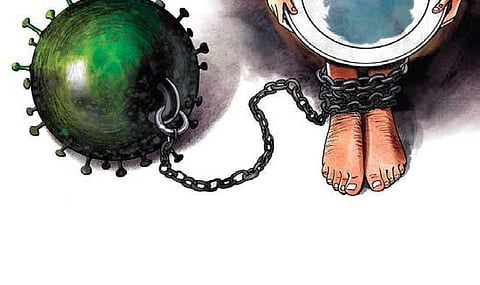

KOCHI: Never would have anyone seen even in his/her wildest dreams how grim 2020 would turn out to be. Covid-19 has had an impact on the humanity as a whole, and the struggles each one is going through to recover from its blow would have been just storylines for imaginative sci-fi filmmakers about a year back.
Eight months into our fight against Covid-19, such nightmares have turned reality all over Kerala. L
ives have been destroyed and businesses ruined, and the worst part of the whole sordid episode is the stigma associated with the pandemic, belying the image of a socially advanced state.
Hameed (name changed), a resident of a Kasaragod village and owner of a small grocery shop there, is one such victim. His son, who returned home from Dubai in April, tested positive for Covid-19. His shop was shut down and the whole family was tested. But the rest of the family was found to uninfected. But the damage had been done.
His business and his life were never the same again. The Covid stigma stuck with the family, and customers stayed away from his shop. Even seven months down the line, things haven’t changed for Hameed and his family.
“Covid-19 and the stigma associated with it have ruined my life,” rues Hameed.
Fifty-two-year-old Joseph, a resident of Vaikom, used to tether his cows daily in the morning for grazing in his vacant plot nearby. “My son’s family tested positive for Covid earlier this month.
They were asymptomatic and, therefore, advised home treatment. They stay on the first floor of the house and are completely isolated from the rest of the family. Now they have tested negative, and are in quarantine for seven days at home. The other day, when I was taking my cows out for grazing, a few people created a ruckus about me moving about. I have not tested positive for Covid, and yet I am being stigmatised. Our cows are a source of livelihood for us... Can I let them starve due to Covid?” asks Joseph.
“Nowadays, I get up at 4am before the rest of the village wake up to graze my cows. I don’t want any trouble for myself at this age,” he says.
In another instance of mindless stigmatising, Binu George and his family have been alienated by others in their residential area. The family had tested positive in September and, while his wife was placed in paid institutional quarantine, the rest of the family stayed at home.
“After we all tested positive for the virus, we never stepped out of the house. Our relatives used to get us essentials and leave them at the gate. Now, even after all of us have tested negative, our neighbours are treating us like outcasts.
Even those people who stopped by the house regularly are behaving like strangers. It is really hurtful when neighbours, who once were close, avoid us deliberately,” said Binu, a resident of Kizhakkambalam, Ernakulam.
The Union Health Ministry had launched a campaign earlier, which aimed to help young people develop as youth advocates and raise their voice against stigma and discrimination during the Covid-19 pandemic. Both at the state and national levels, initiatives were taken to spread awareness to clear misconceptions associated with Covid and curb stigmatisation of recovered patients.
“The pandemic has triggered discriminatory behaviour against anyone perceived to have been in contact with the virus. Even frontline workers, including doctors, nurses and sanitation workers who are putting in selfless efforts to keep the virus in check, have not been spared. After eight months, the stigma persists.
The psychological impact of such actions on the infected persons and families is long lasting. A large number of people have already been infected, anyone can get infected any day. If not today, it may be us tomorrow,” said a psychologist at a government hospital in Kochi.